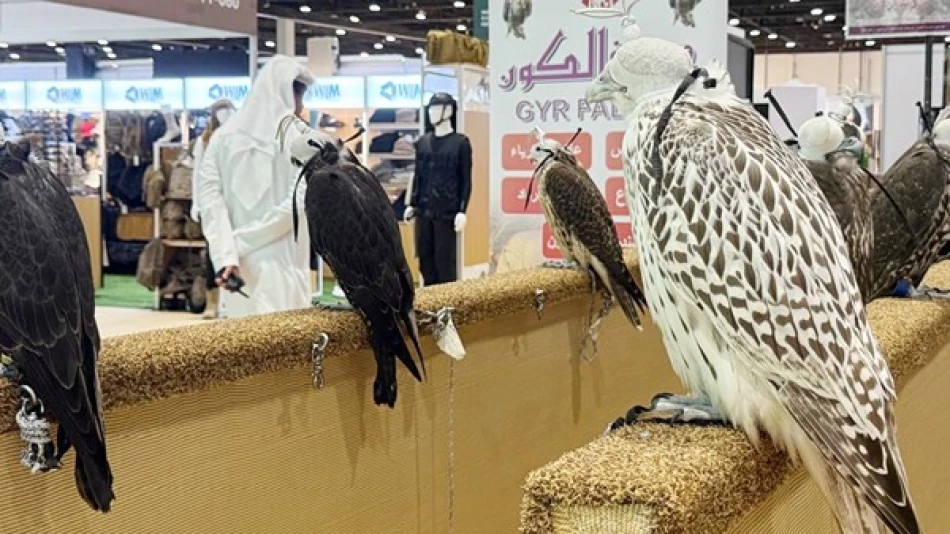
Enhancing Falconry Through Smart Cameras and Tracking Devices at Abu Dhabi International Hunting and Equestrian Exhibition
UAE's Ancient Falconry Sport Gets a High-Tech Makeover with VR Cameras and AI-Powered Training
The United Arab Emirates is pioneering a technological revolution in falconry, blending its centuries-old cultural heritage with cutting-edge innovations. At the 2025 Abu Dhabi International Hunting and Equestrian Exhibition, companies unveiled groundbreaking technologies including falcon-mounted VR cameras, satellite tracking systems, and specialized training drones that promise to transform how this traditional sport is practiced and experienced globally.
World-First Innovation: Seeing Through a Falcon's Eyes
The most striking advancement comes from Al Sharaga Falconry Company, which introduced what they claim is the world's first smart camera system designed specifically for falcons. The ultra-lightweight device, weighing just 38 grams including battery, mounts directly onto the falcon's hood and streams live footage through VR goggles or screens.
According to company founder Afra Al Dhaheri, the technology allows falconers to experience hunts from their bird's perspective in real-time, with a range extending up to 10 kilometers. Each battery provides 20 minutes of operation, sufficient for most hunting expeditions. This innovation represents more than entertainment—it serves as an educational tool for training new falconers and showcasing Emirati culture to international audiences.
Cultural Preservation Meets Modern Tourism
The VR integration reflects the UAE's broader strategy of leveraging technology to preserve and promote traditional practices. By making falconry more accessible and visually compelling, these innovations could attract cultural tourists and younger generations who might otherwise show little interest in the ancient sport. This mirrors successful tech-heritage integrations seen in countries like Japan with traditional crafts and South Korea's digitization of cultural practices.
Satellite Tracking: From Single Birds to Entire Flocks
Tracking technology has evolved dramatically from basic radio transmitters to sophisticated GPS systems capable of monitoring up to 20 falcons simultaneously. Marshall Company's sales manager Majid Najm explained how modern devices combine traditional radio tracking—effective in valleys and enclosed environments—with satellite-based GPS systems that excel in open terrain.
These hybrid systems address a critical challenge in falconry: preventing the loss of valuable birds during training or hunting. Some falcons can cost tens of thousands of dollars, making reliable tracking essential for both economic and conservation reasons.
Beyond Sport: Wildlife Conservation Applications
The tracking innovations extend beyond recreational falconry into wildlife conservation. The same technologies now monitor migratory birds and support broader environmental protection efforts, aligning with the UAE's growing focus on sustainability and biodiversity preservation.
Training Revolution: Drones Replace Live Prey
Specialized training drones like the "Falcon Trainer" are transforming how falcons learn hunting techniques. Mohammed Al Ali from Al Layth Birds Foundation emphasized how these drones create safer, more controlled training environments that closely mimic natural hunting scenarios without the unpredictability of live prey.
This approach addresses animal welfare concerns while potentially improving training efficiency—a consideration increasingly important as traditional falconry expands globally and faces scrutiny from animal rights organizations.
Market Implications: Luxury Sport Meets Tech Investment
The technological enhancement of falconry represents a niche but potentially lucrative market. The UAE's position as a hub for both traditional falconry and advanced technology creates unique opportunities for specialized tech companies. With falconry practiced across the Gulf states and growing interest in countries like Kazakhstan and Mongolia, the addressable market extends well beyond the Emirates.
For investors, these innovations signal how traditional luxury activities can be enhanced and modernized without losing their essential character. The integration of AI, VR, and satellite technology into falconry could serve as a model for digitizing other heritage sports and practices globally.
Global Competitive Landscape
The UAE's tech-forward approach to falconry contrasts with more traditional practices in countries like Saudi Arabia and Qatar, potentially giving Emirati companies a competitive advantage in international markets. As falconry gains recognition—it was added to UNESCO's list of Intangible Cultural Heritage in 2010—technological sophistication could become a differentiating factor for premium experiences and training programs.
The convergence of heritage preservation, tourism development, and technological innovation positions the UAE as a leader in modernizing traditional practices while maintaining their cultural authenticity—a balance that could prove increasingly valuable in a globalized world seeking both novelty and authenticity.
Most Viewed News

 Layla Al Mansoori
Layla Al Mansoori






